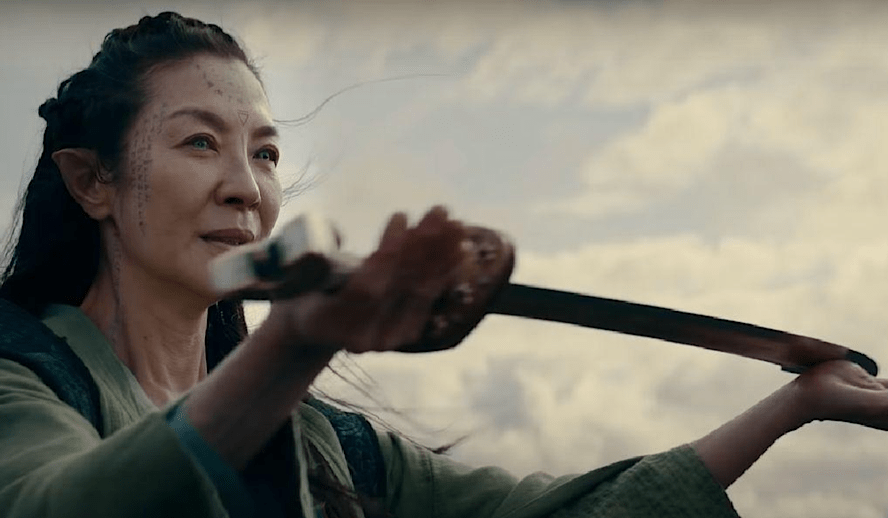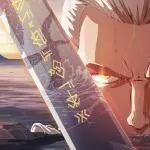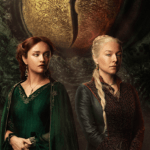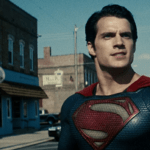Table of Contents

Photo: ‘The Witcher: Blood Origin’
In the wake of the recent announcement that Henry Cavill will not be returning to Netflix’s ‘The Witcher’ for a third season over “creative differences”, thus making way for Liam Hemsworth to assume the role of Geralt of Rivia, fans of the beloved franchise have become unsure of the overall trajectory of ‘The Witcher’ universe going forward, to say the least. What does this sudden recasting mean for the future of the show? Will the franchise ultimately fold in an act of creative surrender, after its upcoming third season? The answers to these questions will become clear soon enough, but for now, Netflix is currently concerned with exploring the distant past of their new branch of the hit-adult fantasy franchise, in the prequel mini-series entitled, ‘The Witcher: Blood Origin’.
Things to do:
- Subscribe to The Hollywood Insider’s YouTube Channel, by clicking here.
- Limited Time Offer – FREE Subscription to The Hollywood Insider
- Click here to read more on The Hollywood Insider’s vision, values and mission statement here – Media has the responsibility to better our world – The Hollywood Insider fully focuses on substance and meaningful entertainment, against gossip and scandal, by combining entertainment, education, and philanthropy.
The show’s four-episode arc follows the primordial confluence of forces that combined to create a singular, cataclysmic event, from the dawn of ‘The Witcher’ timeline. This event, much referenced in pre-existing Witcher lore, is known as the “Conjunction of the Spheres”. This calamitous, multiversal episode, leaves the world of the Witcher, commonly referred to as “The Continent”, forever crawling with a litany of fantastically morbid creatures. The origins of these creatures lie in the dark, never-ending expanse of the multiverse. This event also coincides with the formation of the very first Witcher. The notion of hiring a Witcher or a “Monster Hunter”, is born in the aftermath of this maelstrom of dark magic. Fans have long anticipated a show that would explore this crucial segment of ‘The Witcher’ canon. So how did it pan out? The answer is frankly, a little bit complicated.
Related article: MUST WATCH – The Hollywood Insider’s CEO Pritan Ambroase’s Love Letter to Black Lives Matter – VIDEO
Related article: The Hollywood Insider’s CEO Pritan Ambroase: “The Importance of Venice Film Festival as the Protector of Cinema”
The Witcher Western
The show’s first episode ‘Of Ballads, Brawlers, and Bloodied Blades’ opens with fan-favorite traveling minstrel/poet Jaskier, as he is magically summoned from the midst of a bloody battle, into the enclave of a mysterious elven mage, who promises to tell him with the long-lost “Tale of the Seven, and the formation of the first Witcher”. With this narrative table-setting device in place, ‘Blood Origin’ sets out depicting its story of revenge, cataclysm, star-crossed love, and political decay. The show operates within the tried and true Western-style storytelling structure, of a rag-tag group of mercenaries who are bound together by grief, uniting to take on an overwhelming force, in the name of righteous revenge. Obviously, the history of this genre, Akira Kurosawa’s ‘Seven Samurai’ and John Sturges ‘The Magnificent Seven’, in particular, is a major influence on ‘Blood Origin’s narrative and stylistic format.
Our motley crew of sell-swords who go on to be known as ‘The Seven’, are set on an inevitable path of vengeance when the newly crowned Empress Merwyn assumes the throne by means of a bloody coup. This seizure of power wipes out every living member of the ancient clans, to which the Seven belong to. The mission begins in earnest, when the only two surviving members of the now-slaughtered rival clans of Raven and Dog, Éile and Fjall, are slammed together through a violent set of circumstances, in which they realize their ambitions for revenge are now aligned. The pair decide to combine forces in hopes of recruiting an army capable of taking down the capital city of Xin’trea, and assassinating the Empress. Throughout the course of this journey, the party gradually increases in size, adding a disparate crew of healers, warriors, and mages alike.
Related article: The Masters of Cinema Archives: The Hollywood Insider Pays Tribute to ‘La Vie En Rose’, Exclusive Interview with Director Olivier Dahan
Related article: – Want GUARANTEED SUCCESS? Remove these ten words from your vocabulary| Transform your life INSTANTLY
Related video: EVOLUTION: Every Tom Cruise Role From 1981 to 2021, All Performances Exceptionally Poignant
Related video: EVOLUTION: Every Johnny Depp Role From 1984 to 2020, All Performances Exceptionally Poignant
Of course, a story that follows a crew of mercenaries united in a mission for justifiable bloodlust, can only be as interesting as the individual characters themselves are. Thankfully, the characterization and chemistry of the seven actors in ‘Blood Origin’ main cast, is, for the most part, rock-solid. Aside from Fjall and Éile (played by Laurence O’Fuarain and Sophia Brown), the two members of The Seven who are the best-rounded out, are the sagacious sword master Scian, played by the inimitable titan of Hong Kong Martial Arts Cinema Michelle Yeoh, and the heartbroken, rambunctious, and deadly hammer-wielding dwarf Meldof, played by with aplomb by newcomer Francesca Mills.
Both of these roles are cast perfectly, and both characters are afforded the necessary screentime to develop their distinct personalities and deeply sympathetic backstories that provide their respective motivations for seeking revenge on the Golden empire of Xin’trea. The only shame is that the show, due to its relatively short run time, is forced to cut corners on the vital character development of several of its supporting lead characters. This is of course no fault of the performers themselves, all of whom bring a discernible level of dramatic commitment to this heightened fantasy world. It’s simply an issue of the show’s finite amount of narrative real estate, which just isn’t as evenly dispersed as it could have been in the context of a longer runtime.
Related article: EVOLUTION: Every Henry Cavill Role From 2001 to 2021, All Performances Exceptionally Poignant
Related article: EVOLUTION: Every Chris Evans Role From 1997 to 2020, All Performances Exceptionally Poignant
Related article: #metoo Revolution: Powerful Questions That Need Answers
Blood and Wine
Netflix’s adaptations of ‘The Witcher’ series, whether it be the rugged adventures of Henry Cavill’s gruff and sardonic Geralt of Rivia (aka the Butcher of Blaviken), or the lurid exploits of Geralt’s teacher Vesemir in the anime-style, ‘The Witcher: Nightmare of the Wolf’, the stories thus far, have all nailed the meat-and-potato fundamentals of the two most viscerally enjoyable elements, that always help to make any great entry in “The Witcher’ universe, soar. Those two elements being the marvelous ‘The Witcher 3: Wild Hunt’ DLC expansion – Blood and Wine. The very best stories in ‘The Witcher’ universe carry a heavy sense of political consciousness to them as well. The Rivian Pogrom, in which all non-humans are suddenly ordered to be slaughtered in ‘The Witcher 2: Assassins of Kings’ is a startling example. But at its core, ‘The Witcher’ is a franchise that has been rendered most vividly, particularly in its Netflix adaptations, when it is leaning into the filthy humor, vividly grotesque taxonomy of creatures, and the propensity for drunken debauchery, that the Witcher profession tends to trade in.
Related article: Seven Fantasy Adaptations That Did and Didn’t Pull It Off
Related article: Is this the Return of High Fantasy? ‘Shadow and Bone’, ‘The Nevers’, ‘Game of Thrones’ Prequel & More
The night before Fjall endures the brutal alchemical transformation (one of the show’s most memorable scenes) that all Witchers after him must go on to face, The Seven decide to throw a wake in honor of him and Éile. It’s one of the few moments in which ‘Blood Origin’ slows down its somewhat bewildering pace, and gives these charismatic performers a chance to play off of each other in an unguarded, drunken state. Meldoff explains the tragic backstory of the formation of her trusty hammer to Brother Death, the former Xin’trean alchemist Syndril reconciles his past mistakes with the healer Zacaré, while Fjall and Éile consummate their unexpected love affair. While this scene, in particular, excels without a single drop of blood being spilled, make no mistake, ‘The Witcher: Blood Origin’, does not skimp on the exhilarating violence that fans of the series have come to expect.
Numerous sequences that feature acrobatically blocked, staged, and choreographed action, in which Michelle Yeoh is stabbing Xin’trean foot soldiers through the cornea, and Fjall is wedging his axe in the breastplate of his enemies, are all on par with the best moments of action that were captured in Henry Cavill’s ‘The Witcher’. When ‘Blood Origin’ is leaning into the Witcher universes’ signature balance these two tones, – blood and wine – the show is firing on all cylinders.
Related article: FACT-CHECKED Series: Timothee Chalamet and 32 Facts about The Young Superstar
Related article: ‘House of The Dragon’ Is The Best Show of the Year
Related article: Streaming Style: Binged Netflix’s ‘The Witcher’ vs Weekly ‘Star Wars: The Mandalorian’: Is the Binge Model Killing Prolonged Conversation?
Room To Improve
One of ‘The Witcher: Blood Origin’s most obvious foibles, is the show’s attempt to comprehensively chronicle the fall of the ancient Elven empire of Xin’trea, over the course of fewer than four hours of television. This storyline is where the crunch of the series’ mere 4-episode length is felt most evidently. One cannot help but feel anxious to return to the story The Seven, each and every time the show cuts back to the significantly less interesting palace intrigue plots, of Empress Merwyn attempting to hold court, while the absurdly power-hungry Chief Sage Balor follows his doomed quest to summon creatures from the multiverse. In a year in which ‘House of The Dragon’ and ‘Andor’, two other sci-fi/fantasy shows, gave master classes in palace intrigue and political storytelling, these dueling Xin’trean storylines, feel noticeably undercooked.
Another unfortunate drag on the mini-series can be felt in the visual effects department. The world of the Witcher is uniquely defined by its expansive bestiary of creatures that the Witchers themselves earn a living by hunting (Leshens, Fiends, Alghouls, Kikimoras etc). Creatures inspired by a vast history of European folklore and classified by author Andrzej Sapkowski, with the resident level of practical detail that a professional monster hunter would actually have to consider. This leaves ‘Blood Origin’s middling, and sometimes incomplete special effects, feeling like a stark and disappointing step down from the more polished creature design and world-building, found throughout both seasons of ‘The Witcher’.
Related article: Unveiling the Chaotic World of ‘The Witcher’
Related article: Must-Watch – ‘The Witcher: Nightmare of the Wolf’ Ups Netflix’s Anime Game
All in all, ‘The Witcher: Blood Origin’ is an admirable realization of the origins of Sapkowski’s world, albeit a flawed one. Luckily, the essential elements that define this universe, both tonally and canonically (the final episode ties in directly with the upcoming third season) always remain intact. Despite the shop-worn predictability of some of the major storylines, and the relative lack of polish in the visual effects department, ‘The Witcher: Blood Origin’ performances are memorable, its action is consistently intense, the photography of all of the gorgeous natural landscapes that the show utilizes is stunning, and the details of ‘The Witcher’ lore, are genuinely elucidated for fans, in a meaningful way. If you are a die-hard Witcher fanatic at heart, you will undoubtedly find a great deal of content to appreciate in this mini-series. If not, ‘The Witcher: Blood Origin’ is at least worth watching, for its informative exploration of the rich Witcher mythology.
Creator: Declan De Barra
Cast: Michelle Yeoh, Francesca Mills, Nathaniel Curtis, Lenny Henry, Dylan Moran, Josh Batey, Sophia Brown, Jacob Collins-Levy, Zach Wyatt, Huw Novelli.
Read Next: Did Henry Cavill Really Leave ‘The Witcher’ Over Creative Differences?
By Dillon Goss-Carpenter
Click here to read The Hollywood Insider’s CEO Pritan Ambroase’s love letter to Cinema, TV and Media. An excerpt from the love letter: The Hollywood Insider’s CEO/editor-in-chief Pritan Ambroase affirms, “We have the space and time for all your stories, no matter who/what/where you are. Media/Cinema/TV have a responsibility to better the world and The Hollywood Insider will continue to do so. Talent, diversity and authenticity matter in Cinema/TV, media and storytelling. In fact, I reckon that we should announce “talent-diversity-authenticity-storytelling-Cinema-Oscars-Academy-Awards” as synonyms of each other. We show respect to talent and stories regardless of their skin color, race, gender, sexuality, religion, nationality, etc., thus allowing authenticity into this system just by something as simple as accepting and showing respect to the human species’ factual diversity. We become greater just by respecting and appreciating talent in all its shapes, sizes, and forms. Award winners, which includes nominees, must be chosen on the greatness of their talent ALONE.
I am sure I am speaking for a multitude of Cinema lovers all over the world when I speak of the following sentiments that this medium of art has blessed me with. Cinema taught me about our world, at times in English and at times through the beautiful one-inch bar of subtitles. I learned from the stories in the global movies that we are all alike across all borders. Remember that one of the best symbols of many great civilizations and their prosperity has been the art they have left behind. This art can be in the form of paintings, sculptures, architecture, writings, inventions, etc. For our modern society, Cinema happens to be one of them. Cinema is more than just a form of entertainment, it is an integral part of society. I love the world uniting, be it for Cinema, TV, media, art, fashion, sport, etc. Please keep this going full speed.”
More Interesting Stories From The Hollywood Insider
– Want GUARANTEED SUCCESS? Remove these ten words from your vocabulary| Transform your life INSTANTLY
– A Tribute to Martin Scorsese: A Complete Analysis of the Life and Career of the Man Who Lives and Breathes Cinema
– Do you know the hidden messages in ‘Call Me By Your Name’? Find out behind the scenes facts in the full commentary and In-depth analysis of the cinematic masterpiece
– A Tribute To The Academy Awards: All Best Actor/Actress Speeches From The Beginning Of Oscars 1929-2019 | From Rami Malek, Leonardo DiCaprio To Denzel Washington, Halle Berry & Beyond | From Olivia Colman, Meryl Streep To Bette Davis & Beyond
– In the 32nd Year Of His Career, Keanu Reeves’ Face Continues To Reign After Launching Movies Earning Over $4.3 Billion In Total – “John Wick”, “Toy Story 4”, “Matrix”, And Many More
the witcher, the witcher, the witcher, the witcher, the witcher, the witcher, the witcher, the witcher, the witcher, the witcher, the witcher, the witcher, the witcher, the witcher, the witcher, the witcher, the witcher, the witcher, the witcher, the witcher, the witcher,

Dillon is a writer, and a lover of storytelling and creativity across all mediums. He studied Film and Digital Media at UC Santa Cruz, where he became a voracious consumer and ponderer of the creative arts. He has a background in screenwriting, as well as freelance film theory and pop culture journalism. Dillon connected to the inclusive, empowering mission statement of The Hollywood Insider, because of his shared belief in the power of storytelling, and its facility to engender empathy and understanding, as well as entertain. He believes in finding joy and purpose through making, watching, discussing, and dissecting the diverse collection of creative media that inspires him. He has particular interest in stories that come from largely unheard, historically excluded perspectives.








